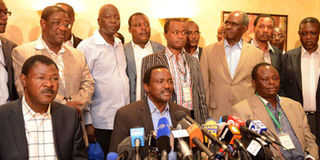Uhuru lead narrows as Cord protests tallying

Raila Odinga's running mate Kalonzo Musyoka addressing the press on March 7, 2013. Photo/RAPHAEL NJOROGE
What you need to know:
- IEBC rejects Cord campaign’s call to stop result updates and denies claims of tallying irregularities
A dramatic surge last night saw Cord alliance presidential candidate Raila Odinga cut into the early lead established by his main rival, Mr Uhuru Kenyatta of the Jubilee coalition.
The shift in the vote count came on a day filled with drama when Cord leaders demanded that the Independent Electoral and Boundaries Commission (IEBC) halt the tallying of votes that they claimed were being “doctored”.
During the day Mr Kenyatta seemed to be building up an unassailable lead of over 800,000 votes. But as the tallying continued into the night, Mr Odinga steadily surged back into contention and the possibility of a run-off loomed again.
At 1.00am this morning with votes from 166 constituencies tallied, Mr Kenyatta had 3,625,063 votes to Mr Odinga’s 3,406,647 votes.
That put Jubilee candidate under the 50 percent mark needed to secure outright victory, with Mr Odinga just a couple of percentage points behind.
As we went to press, howver, late tallies coming in from Kenyatta’s strongholds in the Meru region had the Jubilee candidate fighting back.
Mr Musalia Mudavadi trailed in a distant third place with 268,323, ahead of Mr Peter Kenneth with 42,776; Mr Mohammed Dida with 28,663 and Ms Martha Karua at 25,254.
Prof James ole Kiyiapi was next with 24,270 while Mr Paul Muite tailed the field with 8,648.
The winner of the election must garner more than 50 per cent of the total vote, as well as at least 25 per cent of the vote in half of the 47 counties.
Earlier in the afternoon, IEBC chairman Isaack Hassan had refuted claims by Cord that the results were being doctored.
Cord presidential running mate Kalonzo Musyoka had claimed that votes cast in some constituencies exceeded the number of registered voters.
“There has been a total failure of the electronic vote transmission system and we have evidence that the results we are receiving have actually been doctored,” the VP said.
At a press conference at Serena Hotel, Nairobi, he named Bureti, Kajiado South, Runyenjes, Wajir North and Kathiani as constituencies where the votes cast overshot the figures of registered voters.
Health minister and Kisumu senator-elect Prof Anyang’ Nyong’o, who is also the ODM secretary-general, added that results from some polling stations in Meru, Gachie and Trans Nzoia also recorded more than 100 per cent voter turn-out.
“The IEBC has blocked us from participating in the verification despite all this,” Prof Nyong’o said.
However, Mr Hassan denied that election results had been doctored. “I can assure that there is no room to doctor results,” he said.
He also denied that in some constituencies the total votes cast exceeded the number of voters. “Where the total votes cast exceed the number of registered voters, those results stand nullified. We are yet to see that,” he said.
A check with the IEBC national tallying centre established that the results for the presidential vote in Kathiani and Wajir North had not been announced by the time Mr Musyoka raised his claims.
The results for Bureti indicated that the total votes cast were 58,064 against 62,930 registered voters. The IEBC website also indicated that the constituency has 62,930 registered voters.
In Runyenjes, the total votes cast were 58,395 out of the 66,410 registered voters which is consistent with the figures on the IEBC website.
In Kajiado South, the IEBC announced that 42,276 votes had been cast against the 46,388 registered voters. Confronted with the facts later in the day, the VP, through an aide asked the Nation to ignore the claim. Earlier, Mr Musyoka had said that the option of Cord moving to court was still open and that the coalition still had various options if the complaints were not addressed.
However, he said Cord was not calling for mass action. “As a coalition, we continue to call for calm, tolerance and peace among Kenyans,” he said.
Mr Musyoka alleged that some IEBC commissioners had complained that they were being compelled to announce dubious results. However, he refused to name the affected commissioners or the people who were forcing them to announce the results.
In response to the Vice-President’s claims, Mr Hassan ruled out interference by external forces.
“There are no divisions within the commission. We are here together and we are working as one commission,” he said.
Mr Musyoka had also claimed that Cord agents at the national tallying centre at the Bomas of Kenya had been locked out. This, he said, raised questions about the integrity of the process.
With him at the press conference were Mr James Orengo, Mr Dalmas Otieno, Mr Amos Wako, Mr Moses Wetang’ula, Mr David Musila, Dr Paul Otuoma, Mr Otieno Kajwang’ and Mr Cyrus Jirongo.
Mr Orengo said Cord was trying to negotiate with the commission with a view to resolving their grievances with little success.
“We are trying to engage them to stop releasing unverified results but they don’t seem to be interested,” he said.
On the question of the high number of spoilt votes recorded during the electronic transmission of results, the IEBC said that a bug which multiplied spoilt votes by eight had been detected.
The number of spoilt votes dropped dramatically after the IEBC abandoned the electronic system and resorted to manual tallying.
The high number of spoilt votes had become a sore issue because it affected computation of the vote percentage to the point where it would determine whether there would be a run-off.
From the provisional results available at the time, inclusion of spoilt votes in the calculation would have reduced Mr Kenyatta’s lead to below the 50 per cent threshold, and thus force a run-off.




